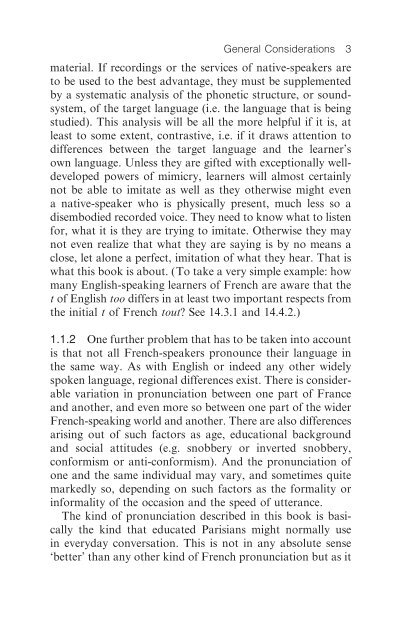An Introduction to French Pronunciation
An Introduction to French Pronunciation
An Introduction to French Pronunciation
You also want an ePaper? Increase the reach of your titles
YUMPU automatically turns print PDFs into web optimized ePapers that Google loves.
General Considerations 3<br />
material. If recordings or the services of native-speakers are<br />
<strong>to</strong> be used <strong>to</strong> the best advantage, they must be supplemented<br />
by a systematic analysis of the phonetic structure, or soundsystem,<br />
of the target language (i.e. the language that is being<br />
studied). This analysis will be all the more helpful if it is, at<br />
least <strong>to</strong> some extent, contrastive, i.e. if it draws attention <strong>to</strong><br />
differences between the target language and the learner’s<br />
own language. Unless they are gifted with exceptionally welldeveloped<br />
powers of mimicry, learners will almost certainly<br />
not be able <strong>to</strong> imitate as well as they otherwise might even<br />
a native-speaker who is physically present, much less so a<br />
disembodied recorded voice. They need <strong>to</strong> know what <strong>to</strong> listen<br />
for, what it is they are trying <strong>to</strong> imitate. Otherwise they may<br />
not even realize that what they are saying is by no means a<br />
close, let alone a perfect, imitation of what they hear. That is<br />
what this book is about. (To take a very simple example: how<br />
many English-speaking learners of <strong>French</strong> are aware that the<br />
t of English <strong>to</strong>o differs in at least two important respects from<br />
the initial t of <strong>French</strong> <strong>to</strong>ut? See 14.3.1 and 14.4.2.)<br />
1.1.2 One further problem that has <strong>to</strong> be taken in<strong>to</strong> account<br />
is that not all <strong>French</strong>-speakers pronounce their language in<br />
the same way. As with English or indeed any other widely<br />
spoken language, regional differences exist. There is considerable<br />
variation in pronunciation between one part of France<br />
and another, and even more so between one part of the wider<br />
<strong>French</strong>-speaking world and another. There are also differences<br />
arising out of such fac<strong>to</strong>rs as age, educational background<br />
and social attitudes (e.g. snobbery or inverted snobbery,<br />
conformism or anti-conformism). <strong>An</strong>d the pronunciation of<br />
one and the same individual may vary, and sometimes quite<br />
markedly so, depending on such fac<strong>to</strong>rs as the formality or<br />
informality of the occasion and the speed of utterance.<br />
The kind of pronunciation described in this book is basically<br />
the kind that educated Parisians might normally use<br />
in everyday conversation. This is not in any absolute sense<br />
‘better’ than any other kind of <strong>French</strong> pronunciation but as it












